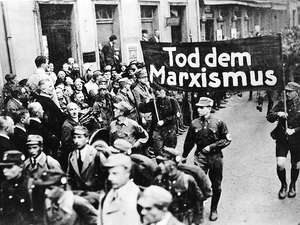In 1919 a Munich locksmith named Anton Drexler founded the Deutsche Arbeiterpartei (DAP; German Workers’ Party). Political parties were still a relatively new phenomenon in Germany, and the DAP—renamed the Nationalsozialistische Deutsche Arbeiterpartei (NSDAP; National Socialist German Workers’ Party, or Nazi Party) in 1920—was one of several fringe players vying for influence in the early years of the Weimar Republic. It is entirely possible that the Nazis would have remained a regional party, struggling to gain recognition outside Bavaria, had it not been for the efforts of Adolf Hitler. Hitler joined the party shortly after its creation, and by July 1921 he had achieved nearly total control of the Nazi political and paramilitary apparatus.
To say that Hitler understood the value of language would be an enormous understatement. Propaganda played a significant role in his rise to power. To that end, he paid lip service to the tenets suggested by a name like National Socialist German Workers’ Party, but his primary—indeed, sole—focus was on achieving power whatever the cost and advancing his racist, anti-Semitic agenda. After the failure of the Beer Hall Putsch, in November 1923, Hitler became convinced that he needed to utilize the teetering democratic structures of the Weimar government to attain his goals.
Over the following years the brothers Otto and Gregor Strasser did much to grow the party by tying Hitler’s racist nationalism to socialist rhetoric that appealed to the suffering lower middle classes. In doing so, the Strassers also succeeded in expanding the Nazi reach beyond its traditional Bavarian base. By the late 1920s, however, with the German economy in free fall, Hitler had enlisted support from wealthy industrialists who sought to pursue avowedly anti-socialist policies. Otto Strasser soon recognized that the Nazis were neither a party of socialists nor a party of workers, and in 1930 he broke away to form the anti-capitalist Schwarze Front (Black Front). Gregor remained the head of the left wing of the Nazi Party, but the lot for the ideological soul of the party had been cast.
Hitler allied himself with leaders of German conservative and nationalist movements, and in January 1933 German President Paul von Hindenburg appointed him chancellor. Hitler’s Third Reich had been born, and it was entirely fascist in character. Within two months Hitler achieved full dictatorial power through the Enabling Act. In April 1933 communists, socialists, democrats, and Jews were purged from the German civil service, and trade unions were outlawed the following month. That July Hitler banned all political parties other than his own, and prominent members of the German Communist Party and the Social Democratic Party were arrested and imprisoned in concentration camps. Lest there be any remaining questions about the political character of the Nazi revolution, Hitler ordered the murder of Gregor Strasser, an act that was carried out on June 30, 1934, during the Night of the Long Knives. Any remaining traces of socialist thought in the Nazi Party had been extinguished.
Read the original article on britannica.com.
More about: Nazi
















































